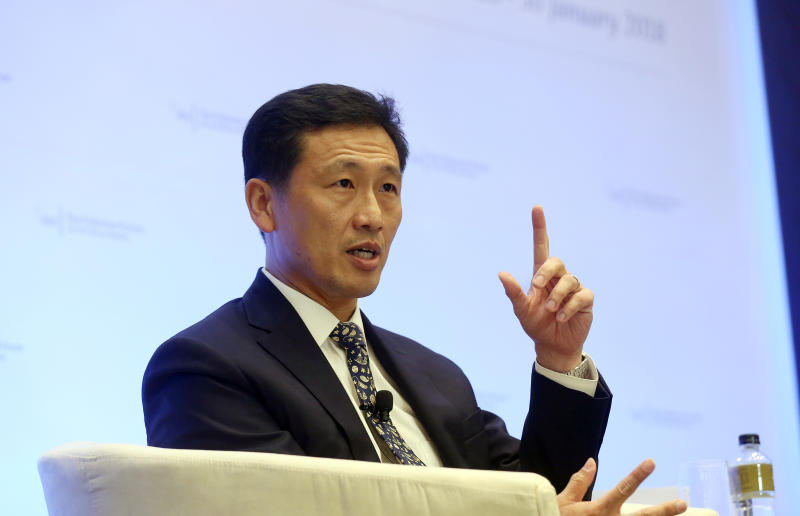Psychological defence vital during peacetime: Ong Ye Kung
Sign up now: Get ST's newsletters delivered to your inbox

Second Minister for Defence Ong Ye Kung speaking at the 6th IISS Fullerton Forum: The Shangri-La Dialogue (SLD) Sherpa Meeting on Jan 29, 2018.
ST PHOTO: SEAH KWANG PENG
SINGAPORE - The most crucial form of peacetime defence is psychological, Second Minister for Defence Ong Ye Kung said on Monday (Jan 29), as the world faces threats like terrorism, online falsehoods and the retreat of globalisation.
Describing psychological defence as trust among people and faith in government, together with a resilience against forces aimed at sowing discord, he explained that it is crucial given that increasingly conflicts are becoming unconventional, weapons are non-military and enemies are non-state players.
Mr Ong was giving a special address at the sixth International Institute for Strategic Studies (IISS) Fullerton Forum: The Shangri-La Dialogue Sherpa Meeting on Monday (Jan 29).
Citing the example of Finland, which celebrated 100 years of independence last month, Mr Ong said that its people are strongly banded together, distinct in their culture and language, and share a collective sense of self-determination.
"It is a well-established social compact, which forms the bedrock of social cohesion, and psychological resilience of a people. It is a cultural ballast, arguably stronger than military defence," he said at the Fullerton Hotel event.
He added that Finns are even able to look up each other's tax returns online while traffic fines are calculated in proportion with the motorist's income.
Mr Ong outlined four challenges that the world faces during his 20-minute speech, addressing an audience of defence officials, senior military officers and academics.
These are: potential instability in the Korean Peninsula, terrorism, online falsehoods, and the retreat of globalisation.
"Psychological defence becomes, we think, the most important prong of peacetime defence", said Mr Ong , who is also Minister for Education (Higher Education and Skills).
"It is about the ability of people to trust each other, have faith in societal and government institutions, provided they are not corrupt, and resilient to forces aimed at sowing discord and creating fissures in society."
Terrorism continues to be one of the region's most serious preoccupations, said Mr Ong.
Although the Philippine Armed Forces recently ended its five-month battle against ISIS-linked militants in the southern city of Marawi, "it would be foolish to believe that this victory has snuffed out terrorism within the region".
Fake news is also increasingly undermining our social fabric and unity, said Mr Ong.
"The techniques used are sophisticated, to give the illusion of public interest, legitimacy and support for the falsehoods and influencing public opinion," he added.
Measures, such as legislation and regulatory safeguards, have already been taken by some countries. Mr Ong cited the example of Germany's Network Enforcement Act, which puts a legal obligation on large social networks to take down illegal content, such as hate speech.
Back home, the Government has released a Green Paper to highlight such threats and set up a Parliamentary Select Committee to solicit public views.
On globalisation, Mr Ong said it has brought about economic progress, opportunities and growth. But these benefits may not be immediately obvious to people in many countries, "who may continue to suffer joblessness, stagnant wages, environmental degradation, and widening social disparity".
Mr Ong said the trajectory of the Korean peninsula is likely to continue remaining uncertain.
The three-day meeting provides a platform for delegates to engage in frank discussions on current defence and security issues.
It leads up to the Shangri-La Dialogue in June which is widely regarded as Asia-Pacific's foremost defence and security summit.
With Singapore acting as the Asean chair this year, Mr Ong added: "Asean's contribution to world peace and stability is not in trying to be a regional power, but by maintaining its neutrality and centrality, to keep the regional architecture open and inclusive, and providing a natural platform for major powers to engage each other."


